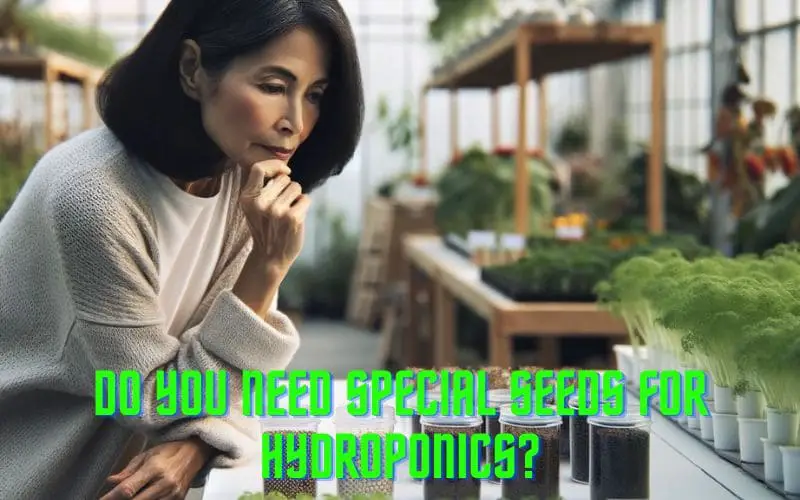Do You Need Special Seeds For Hydroponics? People Often Ask!

Introduction
Welcome to our comprehensive guide on hydroponic gardening. In this article, we will delve into the intriguing world of soilless agriculture, focusing on the benefits and best practices for using special seeds in hydroponics. Whether you’re a gardening enthusiast or a farmer looking to maximize crop yield in minimal space, this article is tailored to provide valuable insights for your hydroponic endeavors.
Answer to the Question
The answer to the question “Do you need special seeds for hydroponics?” is multifaceted. Special seeds play a crucial role in hydroponic gardening due to their unique characteristics that complement the soilless growing environment. In the following sections, we will explore the benefits, types, and best practices associated with using special seeds in hydroponics, shedding light on the significance of seed selection for optimal plant growth.
Benefits of Using Special Seeds for Hydroponics
Nutrient Absorption
Nutrient Absorption
One of the key benefits of using special seeds in hydroponics is their efficient nutrient absorption. As these seeds are specifically bred for soilless cultivation, they are adept at absorbing nutrients directly from the water solution, ensuring that plants receive optimal nourishment for healthy growth. This efficient nutrient uptake is essential for maximizing the yield of hydroponically grown plants.
Space Efficiency of Plants
Special seeds are tailored to promote the space efficiency of plants in hydroponic systems. By selecting seeds that are optimized for compact growth and high yield, hydroponic gardeners can effectively utilize minimal space while cultivating a variety of crops. This space-efficient characteristic of special seeds is particularly advantageous for urban and vertical farming, where space is a premium.
- Special seeds and their compact growth nature enable the cultivation of diverse crops in confined spaces, making hydroponic farming a viable option in urban areas with limited land availability.
- The ability to achieve high yields in a minimal area through the use of special seeds is essential for meeting the increasing demand for locally grown produce in urban environments.
- Space-efficient plants contribute to the feasibility of vertical farming, allowing for the stacking of multiple growing layers in urban settings to maximize production within a small footprint.
Types of Seeds Suitable for Hydroponics
Fast-growing Seeds
In hydroponic gardening, fast-growing seeds are highly desirable for expediting the plant growth cycle. These seeds exhibit rapid germination and accelerated maturation, allowing for quicker harvests and continuous crop replenishment. Varieties such as lettuce, spinach, and kale are popular choices for their fast-growing attributes, making them ideal for hydroponic cultivation.
Disease-resistant Seeds
Disease-resistant Seeds
- Disease-resistant seeds are specifically bred to possess natural resistance to common plant diseases.
- They help maintain the health and vigor of hydroponically grown plants.
- By integrating disease-resistant seeds into hydroponic setups, gardeners can mitigate the risk of crop loss due to diseases.
- This promotes sustainability and yield stability in hydroponic systems.
- Examples of disease-resistant seeds include tomatoes, cucumbers, and peppers.
Best Practices for Seed Selection in Hydroponics
Quality and Purity of Seeds
When selecting seeds for hydroponic gardening, prioritizing the quality and purity of seeds is paramount. High-quality seeds with proven genetic purity and viability are essential for ensuring consistent and vigorous plant growth in the controlled environment of hydroponic systems. By sourcing seeds from reputable suppliers and verifying their quality through germination tests, hydroponic gardeners can establish a strong foundation for successful cultivation.
- Genetic Purity of Seeds: It’s crucial to select seeds with proven genetic purity to ensure the desired characteristics and traits in the resulting plants. Genetic testing and certification can provide assurance in this aspect.
- Viability and Germination Rate: High-quality seeds exhibit a high viability and germination rate, indicating their potential to produce healthy and vigorous plants. Conducting germination tests before planting is a recommended practice.
- Seed Quality Assurance: Reputable suppliers often provide detailed information about seed quality, including the methods used for genetic testing, seed health, and purity standards. Understanding these aspects can aid in informed seed selection.
- Adaptability to Hydroponic Environment: Not all seeds are well-suited for hydroponic cultivation. It’s important to consider the adaptability of seeds to the controlled environment of hydroponic systems, ensuring optimal growth and yield.
